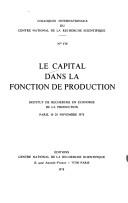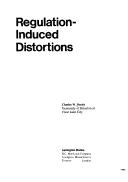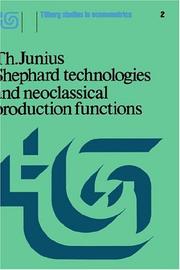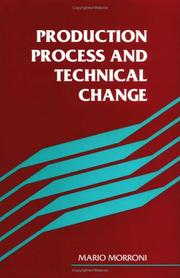| Listing 1 - 10 of 42 | << page >> |
Sort by
|

ISBN: 2222016215 9782222016212 Year: 1974 Volume: 552 Publisher: Paris: CNRS,
Abstract | Keywords | Export | Availability | Bookmark
 Loading...
Loading...Choose an application
- Reference Manager
- EndNote
- RefWorks (Direct export to RefWorks)
Economic conditions. Economic development --- PRODUCTION FUNCTIONS --- Production factors (substitution elasticity) --- Production functions (Economic theory) --- congresses --- Congresses. --- -Functions, Production (Economic theory) --- Production (Economic theory) --- Economics --- Congresses --- Mathematical models --- Conferences - Meetings --- -Congresses --- Functions, Production (Economic theory)
Book
ISBN: 9781840642551 1840642556 9781782549680 Year: 2013 Publisher: Cheltenham Elgar
Abstract | Keywords | Export | Availability | Bookmark
 Loading...
Loading...Choose an application
- Reference Manager
- EndNote
- RefWorks (Direct export to RefWorks)
'This is an extremely important and long-awaited book. The authors provide a cogent guide to all that is wrong with the theory and empirical applications of the discredited notion of an aggregate production function. Their critique has devastating implications for orthodox macroeconomics.' -- Anwar Shaikh, New School for Social Research, US. '"There are none so blind as those who will not see." For decades now John McCombie and Jesus Felipe have been publishing papers which draw out the implications of the conceptual vacuousness that characterises fitting aggregate production function specifications to data to test the validity of the marginal productivity theory of distribution, a critique first developed by Henry Phelps Brown and Herbert Simon. By careful empirical and theoretical work, they have reached the conclusion that the huge literature on aggregate production functions and technical progress is "not even wrong" because predictions cannot be tested, that they are only variations on manipulations of national accounting identities. Perhaps this time it really will be "different", the scales will fall from the profession's eyes. I certainly hope so.' -- G.C. Harcourt, Jesus College, Cambridge, UK and University of New South Wales, Australia. 'This is a very important book. Proofs that aggregate production functions do not exist have been around for more than 50 years. This casts doubt not only on macroeconomic theory but also on empirical work and policy. Yet, this has not deterred macro-economists. The authors show in great detail that the apparent "fit" of such functions to value-based data is a tautology and not a proof that such aggregates exist. One hopes that the profession will finally take note.' -- Franklin M. Fisher, Massachusetts Institute of Technology, US. 'Felipe and McCombie have gathered all of the compelling arguments denying the existence of aggregate production functions and showing that econometric estimates based on these fail to measure what they purport to quantify: they are artefacts. Their critique, which ought to be read by any economist doing empirical work, is destructive of nearly all that is important to mainstream economics: NAIRU and potential output measures, measures of wage elasticities, of output elasticities and of total factor productivity growth.' -- Marc Lavoie, University of Ottawa, Canada. This authoritative and stimulating book represents a fundamental critique of the aggregate production function, a concept widely used in macroeconomics. The authors explain why, despite the serious aggregation problems that surround it, aggregate production functions often give plausible statistical results. This is due to the use of constant-price value data, rather than the theoretically correct physical data, together with an underlying accounting identity that relates the data definitionally. It is in this sense that the aggregate production function is 'not even wrong': it is not a behavioural relationship capable of being statistically refuted. The book examines the history of the production function and shows how certain seminal works on neoclassical growth theory, labour demand functions and estimates of the mark-up, among others, suffer from this fundamental problem. The book represents a fundamental critique of the aggregate production function and will be of interest to all macroeconomists.
Macroeconomics --- Microeconomics --- Economic growth --- Production functions (Economic theory) --- Functions, Production (Economic theory) --- Production (Economic theory) --- Economics --- Mathematical models --- E-books

ISBN: 2222022940 9782222022947 Year: 1978 Volume: 570 Publisher: Paris: CNRS,
Abstract | Keywords | Export | Availability | Bookmark
 Loading...
Loading...Choose an application
- Reference Manager
- EndNote
- RefWorks (Direct export to RefWorks)
Production functions (Economic theory) --- Capital --- congresses --- Mathematical models --- Congresses --- -Production functions (Economic theory) --- -Functions, Production (Economic theory) --- Production (Economic theory) --- Economics --- Capital assets --- Fixed assets --- Capitalism --- Infrastructure (Economics) --- Wealth --- -Congresses --- Conferences - Meetings --- -Mathematical models --- Functions, Production (Economic theory) --- Mathematical models&delete& --- Production functions (Economic theory) - congresses --- Capital - Mathematical models - Congresses
Book
ISBN: 0333128400 9780333128404 Year: 1971 Publisher: London: MacMillan,
Abstract | Keywords | Export | Availability | Bookmark
 Loading...
Loading...Choose an application
- Reference Manager
- EndNote
- RefWorks (Direct export to RefWorks)
Microeconomics --- Production functions (Economic theory) --- 330.35 --- Functions, Production (Economic theory) --- Production (Economic theory) --- Economics --- Economische groei. Kwantitatieve toename. Technische vooruitgang --zie ook {338.09} --- Mathematical models --- 330.35 Economische groei. Kwantitatieve toename. Technische vooruitgang --zie ook {338.09}
Book
ISBN: 9023729234 Year: 1976 Publisher: Place of publication unknown Tilburg University Press
Abstract | Keywords | Export | Availability | Bookmark
 Loading...
Loading...Choose an application
- Reference Manager
- EndNote
- RefWorks (Direct export to RefWorks)
Capital --- Production functions (Economic theory) --- Functions, Production (Economic theory) --- Production (Economic theory) --- Economics --- Mathematical models --- Capital productivity --- Prices --- Capital output ratios --- Productivity of capital --- Industrial productivity --- Government productivity --- Labor productivity

ISBN: 0669969338 9780669969337 Year: 1975 Publisher: Lexington, Mass.: Lexington books,
Abstract | Keywords | Export | Availability | Bookmark
 Loading...
Loading...Choose an application
- Reference Manager
- EndNote
- RefWorks (Direct export to RefWorks)
Production (Economic theory) --- Production functions (Economic theory) --- 658.51 --- Functions, Production (Economic theory) --- Economics --- Microeconomics --- Supply and demand --- Demand (Economic theory) --- Supply-side economics --- Organization of production --- Mathematical models --- 658.51 Organization of production

ISBN: 9020707272 Year: 1977 Publisher: Leiden Nijhoff
Abstract | Keywords | Export | Availability | Bookmark
 Loading...
Loading...Choose an application
- Reference Manager
- EndNote
- RefWorks (Direct export to RefWorks)
Production functions (Economic theory) --- 330.35 --- Functions, Production (Economic theory) --- Production (Economic theory) --- Economics --- 330.35 Economische groei. Kwantitatieve toename. Technische vooruitgang --zie ook {338.09} --- Economische groei. Kwantitatieve toename. Technische vooruitgang --zie ook {338.09} --- Mathematical models --- Microeconomics
Book
ISBN: 3540068902 0387068902 3642808646 9780387068909 9783540068907 Year: 1974 Volume: 99 Publisher: Berlin: Springer,
Abstract | Keywords | Export | Availability | Bookmark
 Loading...
Loading...Choose an application
- Reference Manager
- EndNote
- RefWorks (Direct export to RefWorks)
Economic production --- Business & Economics --- Economic Theory --- 330.105 --- 330.35 --- Production (Economic theory) --- -Production functions (Economic theory) --- -Functions, Production (Economic theory) --- Economics --- Microeconomics --- Supply and demand --- Demand (Economic theory) --- Supply-side economics --- Wiskundige economie. Wiskundige methoden in de economie --- Economische groei. Kwantitatieve toename. Technische vooruitgang --zie ook {338.09} --- Congresses --- Mathematical models --- -Wiskundige economie. Wiskundige methoden in de economie --- 330.35 Economische groei. Kwantitatieve toename. Technische vooruitgang --zie ook {338.09} --- 330.105 Wiskundige economie. Wiskundige methoden in de economie --- Production functions (Economic theory) --- Congresses. --- congresses --- -330.105 Wiskundige economie. Wiskundige methoden in de economie --- Functions, Production (Economic theory) --- PRODUCTION (Economic theory) --- congresses. --- PRODUCTION (Economic theory) - congresses. --- Production functions (Economic theory) - congresses
Book
ISBN: 1280817062 9786610817061 0387352317 Year: 2007 Publisher: New York : Springer,
Abstract | Keywords | Export | Availability | Bookmark
 Loading...
Loading...Choose an application
- Reference Manager
- EndNote
- RefWorks (Direct export to RefWorks)
Providing a systematic and comprehensive treatment of recent developments in efficiency analysis, this readable book makes available an intuitive yet rigorous presentation of advanced nonparametric and robust methods. This flexible toolbox can be used in theories based on the neoclassical theory of production and its alternatives, including evolutionary theories. The methods are complemented by empirical analysis of three different economic fields: scientific research, mutual funds industry and the insurance sector. The research demonstrates the utility of the toolbox for a wide range of economic issues, including the analysis of economies of scale and scope, dynamics of age and agglomeration effects, trade-offs in production and service activities, and explanations of efficiency differentials. Of interest to applied economists broadly, this book will also be of interest to those focused on Operations Research and/or Management Science. "Léopold Simar is a pioneer. For over a decade he and a succession of talented co-authors have been addressing the shortcomings of the increasingly popular field of nonparametric frontier analysis for producer performance evaluation. The shortcomings of nonparametric frontier models include their deterministic and non-statistical nature, their sensitivity to outliers and extreme values, the absence of parameters that would enhance economic interpretation, and the lack of suitable techniques for incorporating exogenous influences on performance. This book, written with Cinzia Daraio, develops theoretical and empirical techniques for dealing with each. The problems are difficult and the analysis is advanced, but Simar and Daraio have delivered on their claim to have written a book that is both rigorous and readable. This original contribution will change the field." -C. A. Knox Lovell Léopold Simar is an established star in the productivity/efficiency field. He is like a fine vintage wine – a pleasure to drink today. Cinzia Daraio is a rising star. She is like a new wine from an established vineyard – excellent today, even better tomorrow. Cinzia and Leopold combine forces in this book. The result is a treat to drink, worthy of a feast. It is a sumptuous presentation of new research that embeds the nonparametric approach to efficiency measurement into a statistical framework. Enjoy" -Harold O. Fried.
Industrial efficiency. --- Input-output analysis. --- Industries. --- Production functions (Economic theory) --- Functions, Production (Economic theory) --- Production (Economic theory) --- Economics --- Industrial production --- Industry --- Interindustry economics --- Economics, Mathematical --- National income --- Input-output tables --- Efficiency, Industrial --- Industrial management --- Mathematical models --- Accounting --- Operations research. --- Management. --- Operations Research/Decision Theory. --- Administration --- Industrial relations --- Organization --- Operational analysis --- Operational research --- Industrial engineering --- Management science --- Research --- System theory

ISBN: 0521410010 0521119731 0511599013 9780521410014 9780511599019 9780521119733 Year: 1992 Publisher: Cambridge Cambridge University Press
Abstract | Keywords | Export | Availability | Bookmark
 Loading...
Loading...Choose an application
- Reference Manager
- EndNote
- RefWorks (Direct export to RefWorks)
This book, first published in 1992, attempts to unify the economic analysis of the production process in order to understand the effects of technical change. It is both an analytical representation of the production process, taking into account the temporal, organizational, and qualitative dimensions of production, and a fact-finding model for studying the economic effects of technical change. The inclusion of temporal and organizational aspects allows the author to examine the analytical implications of research on the nature of firms and the characteristics of technical change, whilst the model is used to analyse technical changes that involve variations of scale or degrees of flexibility. This book deals with themes much discussed in research in industrial economics and management studies and is an important contribution to bringing these two areas of research closer together, providing a general framework for the study of production processes.
Microeconomics --- Economic production --- Production functions (Economic theory) --- Technological innovations --- Economic aspects --- Mathematical models. --- Business, Economy and Management --- Economics --- Technological innovations - Economic aspects - Mathematical models. --- Functions, Production (Economic theory) --- Production (Economic theory) --- Mathematical models --- THEORIE ECONOMIQUE --- FONCTIONS DE PRODUCTION --- PROGRES TECHNIQUE --- INNOVATION --- NOUVELLES TECHNOLOGIES
| Listing 1 - 10 of 42 | << page >> |
Sort by
|

 Search
Search Feedback
Feedback About UniCat
About UniCat  Help
Help News
News